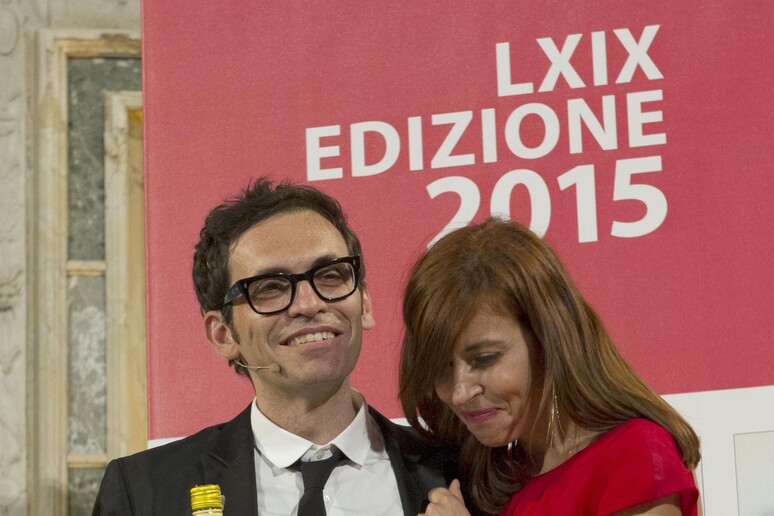(By Denis Greenan).
Nicola Lagioia has won the 69th Strega prize with his novel the La Ferocia (Ferocity). The complex story of a brother seeking to get to the bottom of his sister's death easily prevailed with 145 of the 368 votes casts.
"I dedicate this prize to my wife Chiara," Lagioia said after receiving the coveted laurel along with a bottle of the famed yellow liqueur the award is named after.
"Without her La Ferocia would not have been possible," he said, sipping from the open bottle and offering his wife a couple of nips too.
"Ferocity, like the title of the book, is what is happening now in Athens," added the winner, who is one of the jury that picks each year's Venice Film festival entries.
"We're all in the same boat, if Greece fails Germany will fail too".
Lagioia prevailed over Mauro Covacich, second with La Sposa (The Bride) on 89 votes, and mysterious writer Elena Ferrante - whose identity has been a secret for decades - with Storia della Bambina Perduta (History of the Lost Girl).
It was the second win in a row for the Einaudi publishing house, perhaps Italy's most prestigious.
La Ferocia, a mix of noir, gothic horror story and family saga set in Lagioia's native Puglia, is now set to get the usual sales boost conferred by Strega status.
The Strega is perhaps the most high-brow of Italy's three big book awards. The others are the Viareggio and Campiello prizes. The name Strega, which means witch in Italian, refers to the prize's sponsors, producers of the sweet sun-yellow liqueur.
Lagioia takes over from screenwriter Francesco Piccolo who won last year with his bittersweet memoir of life on the Italian Left, Il Desiderio di Essere come Tutti (The Desire to Be Like Everyone).
Piccolo also last year this year scooped an Italian Oscar, a David di Donatello, for the screenplay to Paolo Virzi's acclaimed Il Capitale Umano (Human Capital).
The winner two years ago was Walter Siti with his seventh novel, Resistere Non Serve A Niente (It's No Use Resisting).
In 2012 the prize went to Alessandro Piperno with Inseparabili (Inseparable).
Other recent winners of the Strega have included Niccolo' Ammanati, Maurizio Maggiani and Sandro Veronesi.
Of these, Ammanati is perhaps the best known abroad because of his 2001 cult thriller Io Non Ho Paura (I'm Not Scared) which was turned into a 2003 film of the same name by Oscar-winning director Gabriele Salvatores.
The Einaudi publishing house was founded by Giulio Einaudi, the son of Italy's first president, in 1933 and published some of Italy's best-known authors.
It was also the first house to publish Boris Pasternak's Doctor Zhivago, in 1957, when the famous novel was banned in the Soviet Union.
The Strega prize was founded in 1947 by author Maria Bellonci (1902-1986).
Bellonci, best-known for her successful biographies of historical figures like Marco Polo and Lucretia Borgia, wanted to encourage literary freedom of expression after its repression under Fascism.
Perhaps the biggest-hitting past winners are Cesare Pavese, Alberto Moravia, Giorgio Bassani, Elsa Morante, Dino Buzzati, Giuseppe Tomasi di Lampedusa, Carlo Cassola, Natalia Ginzburg, Primo Levi, Umberto Eco and Gesualdo Bufalino.
The Strega prize has been marked by controversy over the years.
There have sometimes been rowdy arguments involving publishers and writers and even allegations of vote rigging.
ALL RIGHTS RESERVED © Copyright ANSA











